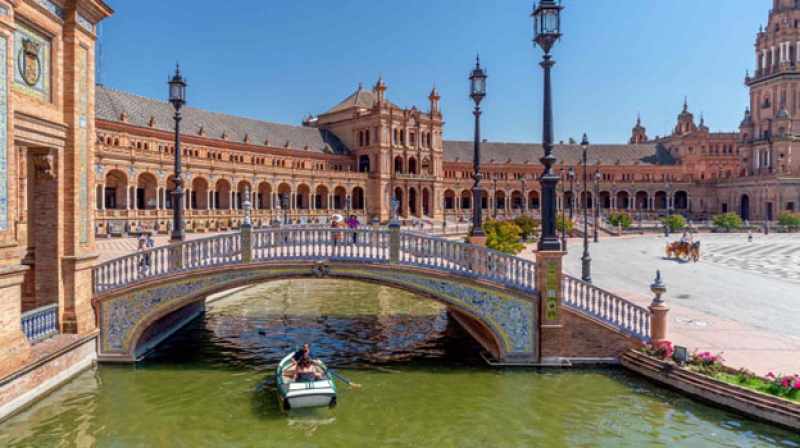- Puppet show enchants Children as Boi Mela comes alive on day 2 |
- DSCC Admin Salam’s drive to make South Dhaka a ‘clean city’ |
- 274 Taliban Dead, 55 Pakistan Troops Killed |
- Now 'open war' with Afghanistan after latest strikes |
- Dhaka's air quality fourth worst in world on Friday morning |
Money’s Power to Build a Fair and Sustainable Future

Plaza de España, Seville
While the world often focuses on crises, conflict, and inequality, one of the most transformative tools for global change rarely makes headlines: development finance. But can money change the world? The answer is yes—when mobilised strategically, equitably, and sustainably.
According to the United Nations Conference on Trade and Development (UNCTAD), over USD 4 trillion is needed annually to achieve the Sustainable Development Goals (SDGs) by 2030. This may seem daunting—until we consider that global financial assets amount to a staggering USD 486 trillion, as reported by the Financial Stability Board.
So, why does only a fraction of this capital support sustainable development? The financing gap is more than a technical issue—it is a reflection of deeper systemic barriers and an opportunity to rethink how the global economy works. Redirecting financial flows towards social and environmental priorities is not just necessary; it is urgent.
Several hurdles limit the effectiveness of development finance: underdeveloped regulatory frameworks, poorly designed incentives, persistent subsidies that undermine sustainability, and a lack of impact standards. Perceived investment risks also deter private sector participation. But with an integrated approach—one that views finance as part of a broader development ecosystem—these challenges can be addressed.
Every dollar aligned with the SDGs can drive powerful change. It can reduce poverty, support innovation, and protect the planet. That’s why building a resilient, inclusive, and accountable global financial system is so critical. Increasingly, countries are adopting financing frameworks that align public and private resources with the goals of the 2030 Agenda.
At the global level, Official Development Assistance (ODA) continues to play a pivotal role. In 2024 alone, the United Nations Development Programme (UNDP) helped unlock over USD 500 in additional investments for every dollar spent on foundational financing. Since 2022, this has amounted to USD 870 billion in climate-resilient finance.
The upcoming Financing for Development Conference (FfD4) in Seville offers a vital platform to strengthen international cooperation. It aims to improve the global financial architecture, ease the debt burdens of vulnerable countries, and promote domestic resource mobilisation through partnerships among governments, investors, and philanthropy.
Central to this vision is the creation of sustainable investment ecosystems. These systems include SDG-aligned project pipelines, de-risking instruments, financial innovation, and robust monitoring frameworks to ensure transparency and measurable impact.
Uruguay provides a compelling case study. Determined to become a regional hub for sustainable finance, the country has pioneered initiatives to channel capital into high-impact projects. Spearheaded by the Sustainable Finance Roundtable—a platform led by Uruguay’s Ministry of Economy and Finance and the Central Bank, with UNDP support—stakeholders have introduced landmark financial instruments to advance the SDGs.
A breakthrough came in 2022 with the issuance of the Sovereign Sustainability Linked-Bond (SSLB). Developed with input from five ministries, UNDP, and the Inter-American Development Bank (IDB), the bond ties financing terms directly to Uruguay’s environmental goals. The first issuance generated USD 1.5 billion in demand, setting a new benchmark for sustainable finance in the region.
In 2024, Uruguay launched its first Social Impact Bond (SIB) focused on dual education, linking investor returns to improvements in youth inclusion and employability. This innovative tool, built through collaboration among public institutions, civil society, and the private sector, is supporting education projects with measurable social outcomes.
Yet, the rise of sustainable finance also brings risks—chief among them, greenwashing: the illusion of environmental or social responsibility without meaningful action. To counter this, Uruguay has adopted a performance-based, transparent approach, using independent verification and clear impact metrics to ensure credibility and trust.
Ultimately, financing the future requires more than capital—it demands accountability. Every financial decision must be judged by its real-world outcomes. Only then can the 2030 Agenda shift from aspiration to reality.
Money, in itself, is neutral. Its value lies in how we choose to use it. We can allow it to entrench inequality—or harness it as a force to build a more just, inclusive, and sustainable world.
Alfonso Fernández de Castro is the Resident Representative of the United Nations Development Programme (UNDP) in Uruguay.

